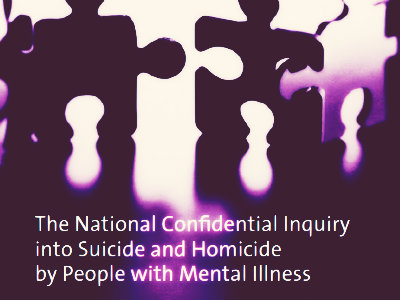
Mental health patients are at the highest risk of taking their own lives in the first two weeks after being discharged from hospital, a study has found.
An analysis of suicides in the UK between 2002 and 2012 found that the first three months after discharge was a time of “particularly high” suicide risk with the risk especially acute in the first two weeks, researchers at the National Confidential Inquiry into Suicide and Homicide found. There were 3,225 suicides in the UK by mental health patients in the post-discharge period; 18% of all patient suicides.
Researchers called for suicides within three days of discharge to be added to the list of NHS ‘never events’ in England and Wales and the list of ‘serious adverse events’ used by health services in Scotland and Northern Ireland. Providers must investigate all ‘never events’ and report on them publically in annual reports.
Professor Louis Appleby, Director of the National Confidential Inquiry, said: “This increased risk has been linked to short admissions and to life events so our recommendations are that careful and effective care planning is needed including for patients before they are discharged and for those who self-discharge.
“Early follow-up appointments should be strengthened and reducing the length of in-patient stay to ease pressure on beds should not be an aim in itself. Instead health professionals should ensure the adverse events that preceded the admission have been addressed.”
Mental health campaigners voiced concerns that the pressure on mental health beds and crisis teams could see patients discharged too early and put at risk. Over the past year, a series of investigations by Community Care and BBC News has highlighted growing pressure on services for acutely unwell adults and children.
Paul Farmer, Chief Executive of Mind, said: “Mind’s own research has shown that, in many parts of the country, crisis care teams are under-resourced, understaffed and overstretched. We have also heard about beds being cut and the sometimes desperate struggle that people face in finding a bed which can mean being sent miles away from home.
“We would be very concerned if this pressure on beds and budget cuts means that patients are now being discharged from hospital before they are ready, putting them at risk. With the General Election now under a year away, the next government needs to commit to increasing investment in mental health – there really isn’t any room for belt tightening.”
The inquiry found that overall number of suicides in the general population fell from 4,422 in 100 to 4,404 in 2012. Suicides among men rose from 3,402 in 2011 to 3,446. Suicides among females dropped from 1,020 to 958 over the same period.
The number of suicides of people who had been in contact with mental health services in the 12 months prior to death fell from 1,307 in 2011 to 1,272 in 2012.
For confidential support call Samaritans on 08457 909090


 Bournemouth, Christchurch and Poole
Bournemouth, Christchurch and Poole  Hampshire County Council
Hampshire County Council  Lincolnshire County Council
Lincolnshire County Council  Norfolk County Council
Norfolk County Council  Northamptonshire Children’s Trust
Northamptonshire Children’s Trust  South Gloucestershire Council
South Gloucestershire Council  Wiltshire Council
Wiltshire Council  Wokingham Borough Council
Wokingham Borough Council  Children and young people with SEND are ‘valued and prioritised’ in Wiltshire, find inspectors
Children and young people with SEND are ‘valued and prioritised’ in Wiltshire, find inspectors  How specialist refugee teams benefit young people and social workers
How specialist refugee teams benefit young people and social workers  Podcast: returning to social work after becoming a first-time parent
Podcast: returning to social work after becoming a first-time parent  Podcast: would you work for an inadequate-rated service?
Podcast: would you work for an inadequate-rated service?  Family help: one local authority’s experience of the model
Family help: one local authority’s experience of the model  Workforce Insights – showcasing a selection of the sector’s top recruiters
Workforce Insights – showcasing a selection of the sector’s top recruiters 

 Facebook
Facebook X
X LinkedIn
LinkedIn Instagram
Instagram
Comments are closed.